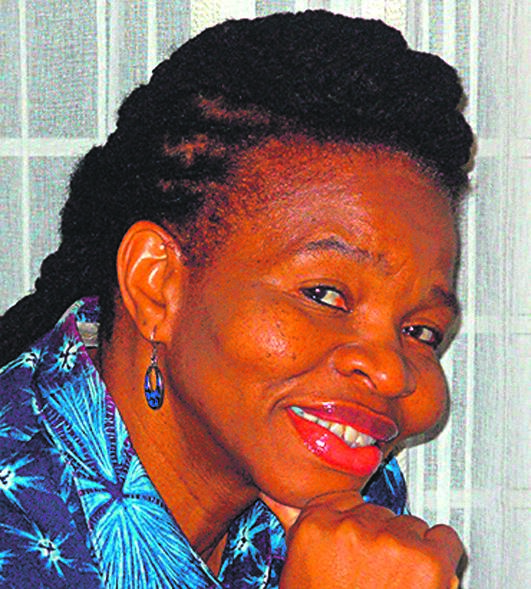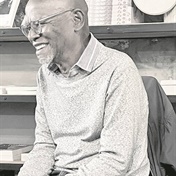
Fool’s Gold edited by Arja Salafranca
Published by Modjaji Books
214 pages
R280
PRAYERS BY MAKHOSAZANA XABA
My name is Refiloe. I am 13 years old. My sister Lesedi is four. My parents passed away last year. Papa went first, three months before Mme. It all began in February last year, when Papa came back from the mines in Johannesburg.
An ambulance dropped him right in front of our home, too ill to walk and talk.
The driver of the ambulance spoke to Mme for a long time as the neybars helped carry Papa into the house. He told Mme how difficult it was to find our village because it is tucked away between two hills, and he is not used to driving in areas where there are no road signs.
And the roads are very bad. What he didn’t know is that the roads were once horrific. At least now they are wider and that makes it easier for cars – now two cars can stand alongside each other. This means that the road does not get used up too quickly, and on rainy days mud does not accumulate too fast, making them impassable.
I remember that day when a man came from the government offices to talk to all the elders in the village about the plans to improve the roads and install a water pump for our village, which we could all use instead of going all the way to the river.
Mme was delighted, so was I. We had a water tank that my father bought years ago, when I was seven. But in winter when there are no rains, we use up all the water and have to go to the river. I hate walking to the river in winter, it gets dark very early and the shadows of the hill make it so much colder than it really is. The river is right next to the foot of the hill, where it really freezes.
As I was saying, the ambulance driver complained to Mme. He said he had to stop many times asking people where to find Moosa’s General Dealers, our main store. Apparently that was all my father could tell him because he was very ill and could not talk much.
Although I was very sad to see Papa like that, I was relieved that he had come back home. As Mme kept telling us: “It’s much better to die with your family, with love around you and prayers for your future life.”
Everyone thought Papa would pass away very soon after he arrived home. Many people now say Mme’s love kept him alive. Granny-next-door (her village nickname is very rude, Mme said we could just call her Granny-next-door) kept telling Mme that the reason Papa was staying alive for so long even when he was in such pain was because our ancestors were still paving the way for him in their land.
Apparently there is a special way to be when one arrives in that land. She also said that although we could neither see nor hear Papa talk to them, she was sure it was happening because the ancestors speak in a language we cannot understand.
I asked Mistress Maluleke about ancestors. She just said I must wait until I’m much older: “Understanding ancestors comes with age and maturity, child.”
Most old people in my village talk about ancestors a lot, but they don’t want us present when they have these conversations. Now back to Papa. He passed away six months after the ambulance dropped him off. Many neybars I heard talk to Mme said she was very brave to nurse him until his last day when the hospital could have taken care of him very well. But Mme had one belief: if the hospitals in Johannesburg had sent him home, our hospital in town couldn’t do anything better.
It’s the longest time I remember spending with Papa. As a mining man he only came home for the Christmas and Easter holidays. There were years when he did not come during the Easter holidays because he had no money. One of those years was the year my sister was born. Mme said he had to buy extra food and so many baby clothes that he simply could not afford money to come home. Mme also said this was the life of all mining men in our village. They hardly ever saw their families because there was very little money paid to them.
It takes a long time to dig gold, diamonds and coal from the stomach of the earth. Sometimes they could dig for months without finding even the smallest piece. The bosses paid the miners only when they had dug enough gold and diamonds. Mme always prayed that Papa could find a job in a gold or diamond mine because the mining men were better paid. Papa was in a coal mine that was notorious for paying very little because South Africa did not sell coal to other countries.
I hope I have not bored you with this long beginning, full of recent history. Mistress Maluleke said I must “paint pictures” when I tell this story. Our lives depend on it.
So here is what I should have started with. My school is called Lesedi Primary School, LPS for short. It’s one of the schools built by former president Nelson Mandela. It’s big and beautiful. It is so beautiful it looks lost among the village houses. In this village, many children born that year were named Lesedi, just like my sister.
I will not say much about our school. Mistress Maluleke will be able to tell you much more about it than I can. She will also tell you about how well I perform in class. She can give you all my reports if you need them.
I am now in Grade 7, my last year in primary school. Before I go any further I want to apologise for calling you “you”, as I tell our story. In our culture it’s rude to call an adult “you”, but Mistress Maluleke said I must call you that as she thinks it’s acceptable in your culture. Also, she does not know your name. She said she would write covering letters once she had found out all your names and made copies of this, our story, to send to as many businessmen as possible. That is the only chance we have of getting money to make our prayers and dreams come true.
Everyone at LPS says it was Mistress Maluleke who wrote many letters to Papa Mandela asking him to build a school for us. She even travelled to Johannesburg to talk to Papa Mandela. When I asked her if that was true, she just smiled and said: “I just did my bit, child.” The children want her to become the principal.
Now let me tell you about what Lesedi and I do each day. I wake up at 5am. I cook soft porridge for the two of us on the primus stove. I always make enough for breakfast and lunch if we have enough mealiemeal.
While the porridge is cooking I go to clean our toilet. We still use pit toilets in our village, but ours is one of those nicer ones. Papa built a wooden seat so that we don’t have to squat. It even has a lid that Papa made with his own hands many a Christmas holiday ago. Mme trained me to clean the toilet in the morning before it becomes too hot. The problem with too much heat are the flies and the smell. I don’t mind the flies because I am used to them. It’s the smell I can’t stand. Now that we don’t use wood for cooking, we don’t have ash to throw down the toilet.
The ash acts as air freshener and it’s just one of those things you cannot ask the neybars for because they use all theirs. It takes a lot of ash to take the smell away. Unlike salt that you only need to use a little of at a time.
The complicating thing is that I also cannot use a lot of soap. You see, soap also helps to deal with the smell, but even soap is becoming scarce. I save it. Here is one area where Mistress Maluleke and I disagree.
Read: Book extract: The day I died
I will tell you about the others later. She said I must feel free to tell you my opinions as part of this story. She seems to think that I am not “as frugal as your mother was”. I swear to you, my very name is frugal. She keeps telling me to live “parsimoniously”. I always tell her: “Mistress, our very existence is parsimony.”
Once the porridge is done, I wake Lesedi up and pray. Each night I pray that she doesn’t pee in her bed. As I wake her up I also pray because there are days when she does it just before I wake her up.
That is when I find that it’s still hot and smells fresh. She sleeps on her own grass mat on the floor next to my bed. I make her sleep naked so that I have just one thing to wash because soap is such a problem.
But I know that I cannot do that once winter comes. When Mme passed away, Lesedi went back to infancy.
This is where my first plea to you comes in. I have heard that there are tablets that Lesedi can take to help her stop urinating in her sleep. I am told they are very expensive. Your money will go a long way towards helping us with this. I would really like her to stop as it is affecting her. She starts talking to me rudely, you know, just plain disrespectful. I slap her when she speaks to me like that. Something happens to me, I know I should be patient with her.
If Lesedi’s bed is wet, she takes forever to awaken. She turns and turns in her bed until I shout her name or slap her a little on the back. Once she is fully awake, I wash her face and private parts with very little water in a plastic bowl. I use the same water to wash her sheet.
I don’t mind it so much when she wets herself over the weekend because that’s when I do our washing. Mme said one should never ever leave soiled bed sheets unwashed: “It’s unhygienic.” She liked to say that.
Mme was a cleaner at the village clinic, so she knew all about it. She used to wash Papa’s sheets and pyjamas every morning and as soon as he had messed on himself during the day. Luckily for me, Lesedi does not do the other thing in her sleep. Granny-next-door said I must not use napkins on Lesedi because that would be as good as giving her permission to wet herself.
I think she has a good point. What do you think?
The porridge is usually cooked by the time I finish washing the sheet. I dish up the porridge, then put it aside to cool down. Once I finish the washing I wash my face and private parts quickly, just two hands full of water and a dash of soap.
The problem comes with that time of the month. Blood is hard to wash out. It needs a lot of water and soap. Fortunately for me, I don’t have to buy those expensive sanitary pads. I use the napkins that Mme used for Papa when he could not help himself. They were made from Lesedi’s napkins that Mme sewed together to fit Papa. I cut them all up into small pieces and they work out fine.
But they are not easy on the soap.
When we have eaten and dressed, I put Lesedi in our wheelbarrow and we go to school. We usually leave our house any time after 7am and definitely before 7.30am.
Our school starts at 8.30am because many children come from very far away. It takes me just under an hour to reach school.
 | ||||||||||||||||||||||||||
Get in touchCity Press | ||||||||||||||||||||||||||
| ||||||||||||||||||||||||||
| Rise above the clutter | Choose your news | City Press in your inbox | ||||||||||||||||||||||||||
| City Press is an agenda-setting South African news brand that publishes across platforms. Its flagship print edition is distributed on a Sunday. |




 Publications
Publications
 Partners
Partners









